Cannabis in Arizona
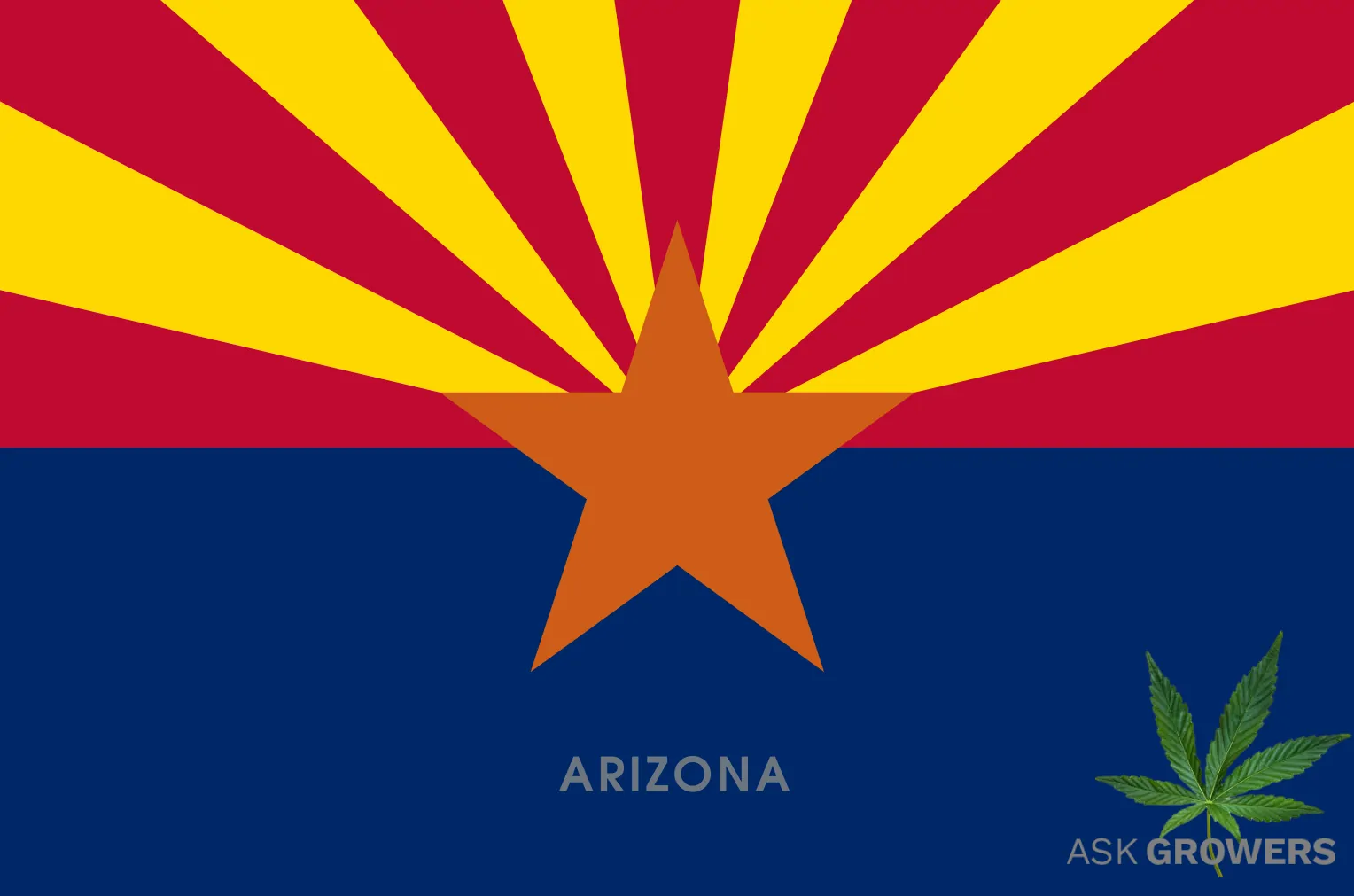
Arizona neighboring states have quite loyal marijuana laws. On the contrary, Arizona's attitude towards cannabis is different and results in strict regulations, steep fines, and even incarceration. The reason is that until November 2020 only medical cannabis was legalized.
Discover all the game rules to become informed and safe if you are traveling to this state.
Is weed legal in Arizona?
In 2010, voters in Arizona approved an initiative that legalized medical cannabis with 50.1% of the vote, and it became the 14th U.S. state to make it legal. Arizona weed laws allow patients to possess 2.5 oz. (70 grams) of cannabis for treatment purposes. Individuals with a medical marijuana (MMJ) card can legally consume, purchase, and possess weed. The product can be purchased in licensed pharmacies every 2 weeks. The patients are also permitted to cultivate not more than 12 weed plants or find a caregiver who can grow for them.
The use of recreational marijuana was prohibited until November 2020. This product was considered as a Schedule Ι substance, including various forms of cannabis (oils, edibles, concentrates, etc.). Now, adults of 21 and older are permitted to consume, possess, and transfer not more than 1 oz. (28 grams) of weed or 5 grams of concentrates, but the regulatory system for its sale and cultivation has not been created yet. The recreational sale will be offered only in April 2021. Arizona lawmakers have time to establish new regulations, and dispensaries have time to get a recreational license.
With recreational cannabis being illegal, individuals without prescription can face felony charges if they possess any weed. The severity of these charges depends on how much cannabis they have. If a person is caught with less than 2 lbs. for personal use, he/she can be punished by imprisonment (from 4 months to 2 years) with an enormous fine of $150,000. A similar fine is applied to the manufacturing, sale, and trafficking of illegal cannabis with a maximum incarceration rate of up to 12.5 years. Even advertising and possession of marijuana paraphernalia is considered a felony.
In 2016, the state didn’t pass the law on the legalization of recreational cannabis for adults 21 and older. The initiative was reintroduced and put back on the ballot. The choice has been made again, and recreational marijuana will be in its legal status this spring.
Buying Marijuana in Arizona?
As a medical cannabis patient, you can obtain this product from state-run pharmacies. The amount of Arizona marijuana you can buy is 2.5 oz. once in 2 weeks. Licensed dispensaries are open from 7/8 a.m. till 10 p.m. The store hours can vary because each city has the right to dictate the operation hours of dispensaries.
The closest dispensary can be identified using the medical dispensary menu that features a convenient directory. There are nearly 100 state-verified establishments around Arizona with Phoenix alone housing around 20 of them.
To buy cannabis with a medical card, you should be 18 years old. To prove this, be ready to provide your ID card to a dispensary employee. Show an MMJ card as a printed copy or via a barcode on your mobile phone.
For people who are not registered with the state program, the purchase of marijuana was illegal, but it is under consideration regarding a new law.
Cannabis delivery service is not greatly developed in Arizona, but in any case, it is legal. The thing is that there are few dispensaries that provide in-house delivery. However, some new delivery technologies are emerging that connect patients with nearby pharmacies and help them get weed in time. Naturally, not more than 2.5 oz. of weed can be delivered.
MMJ patients are allowed to give/donate (not selling) medical weed to other patients. While in Arizona, out-of-state cardholders are allowed to possess and buy up to 2.5 oz. of cannabis due to limitations and pot laws, no matter how much weed they are permitted in their home state.
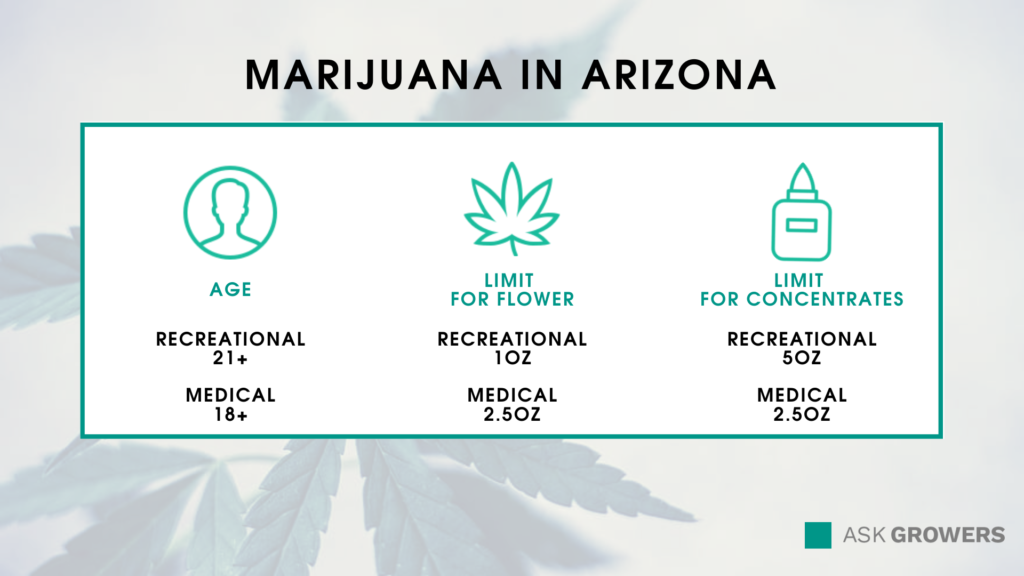
Cannabis consumption in Arizona
Arizona dispensaries offer a variety of weed goods for sale, including cannabis oil, concentrates, topicals, edibles, vapes, flowers, pre-rolls, and other infused products.
With a valid marijuana card, patients are allowed to consume marijuana privately. Regardless of your MMJ patient status, smoking in public places and public transport is prohibited. Also, you cannot use this product in dispensaries because they can lose their license.
Verified patients can consume pot in an edible form in public (except for school grounds) if they are not operating a vehicle or doing any job that can be hindered if they are high.
Even if you are a registered patient of the program, you have to abide by some rules while consuming cannabis.
Arizona patients are not allowed to use medical weed in the following areas:
- on designated federal lands (national forests and parks);
- on private property that prohibits the use of weed;
- in public places (school grounds, school buses);
- in correctional facilities;
- in public transport;
- while operating a vehicle.
This is a list of areas where medical marijuana consumption is permitted:
- in personal residences;
- on grounds of personal residences (porch, backyard);
- in any private residence if its owner accepts the use of weed.
If you are traveling across the state and visiting multiple Arizona sights, be aware that the consumption of weed in the Grand Canyon, Petrified Forest National Park, and Apache-Sitgreaves National Forest is banned since they are federal lands. The users will be subject to federal prosecution.
Taxes on Marijuana in Arizona
In Arizona, recreational marijuana will soon be legal, and there are no taxes related to its purchase, but a 16% excise tax is expected. This section will be updated as the state progresses to more cannabis-friendly laws.
The state sales tax for medical weed is 5.6%, along with the county and city taxes that range from 0.25% to 4%. So, it is not high.
Arizona Medical Marijuana Card
The MMJ card system in Arizona is fully digital. These cards are usually called “a license” or “a green card.” There are several steps to obtain a card, and individuals should follow certain rules to become qualified patients.
How to Get a Medical Marijuana Card in Arizona
If patients require cannabis for medical use, they have to schedule an appointment with a primary physician and get a Physician Certification Form. Typically, doctors charge $75-$150 for an appointment.
If your qualifying condition is approved, fill out a form, and submit an online application through the Arizona Department of Health Services.
Also, the state charges $150 to issue the card. The recent state law extended the expiration date of these cards to 2 years. To renew the card, patients should apply 30 days before it expires.
Arizona allows cardholders who are crossing the state to use cannabis within the state. They should provide proof for their MMJ patient status, otherwise, they will be prosecuted.
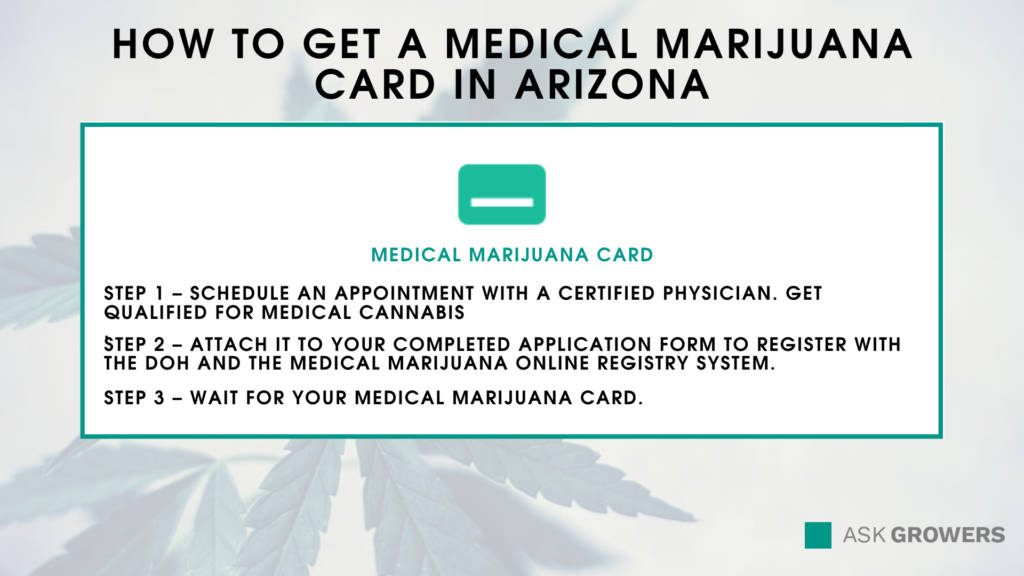
Diseases
To be registered and qualified under the Arizona program, patients must be diagnosed with one of the listed diseases:
- Crohn’s disease;
- HIV/AIDS;
- cancer;
- amyotrophic lateral sclerosis (ALS);
- glaucoma;
- hepatitis C;
- Alzheimer’s disease.
The MMJ card is also issued for patients with medical conditions that cause:
- debilitating/chronic pain (migraines, arthritis, etc.);
- persistent muscle pains;
- seizures (by epilepsy);
- post-traumatic stress disorder (PTSD);
- cachexia/wasting syndrome;
- depression, generalized anxiety disorder;
- severe nausea.
All Arizona citizens (and their caregivers) are allowed into the MMJ program under certain conditions specified in the section below.
Patient qualifications
All patients with the qualifications that are mentioned above can get a medical marijuana card if they:
- have a residential address in Arizona;
- have an Arizona government-issued ID card or a valid driver’s license;
- have a doctor’s recommendation;
- have a registration with the Arizona Department of Health Services;
- are 18 years old (minors must have a caregiver).
If you meet these criteria, you can proceed with the registration process.
Patient registry process
To submit an application, visit the Arizona Department of Health Services website. Download its official checklist before you submit the final application. To apply to the program, you will be required to fill in an application form, attach a photo taken within the last 2 months, and submit a copy of your ID and an MMJ certification form completed by your healthcare professional.
Also, the applicants should submit their fingerprints. Check with your local law enforcement agency if they provide public fingerprinting services and cards. You can contact a private fingerprinting company. Note that these services may charge a fee.
Don’t forget to pay the annual fee ($150). Later, you can check your application status on this website.
Since December 2019, all Arizona MMJ cards have become digital. Physical cards are also valid until their expiration date or they are stolen/lost/changed.
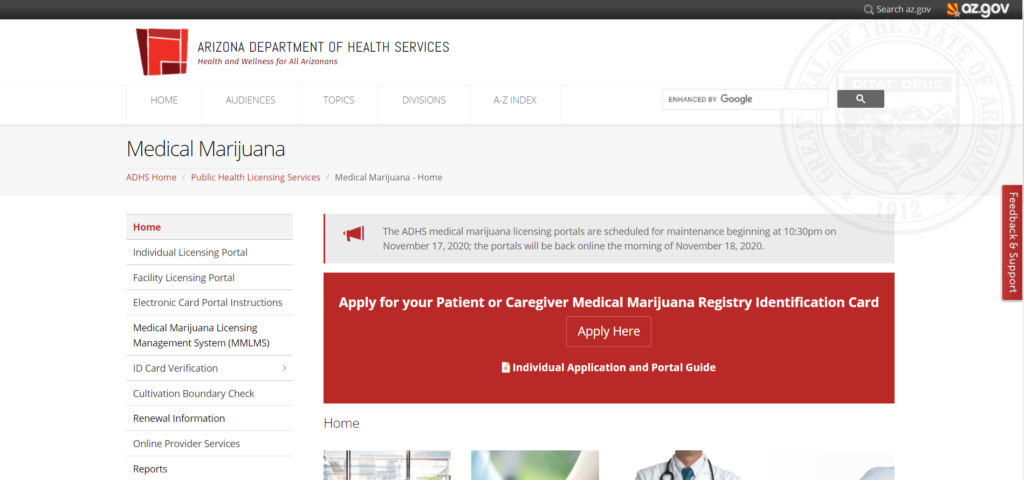
Caregiver qualifications
Arizona allows a minor caregiver (legal guardian/custodial parent) to act as a caregiver for patients under 18. Caregivers should be 21 years or older and have no previous drug felony.
They can provide medical weed to up to 5 patients. Caregivers are permitted to grow up to 12 cannabis plants per one patient, observing the state cultivation rules, if the patient resides over 25 miles away from a qualified pharmacy.
Parents and caregivers should also be registered with the state program and pay the associated fees. They must submit fingerprints as well.
Transporting Marijuana in Arizona
It is illegal to transport and possess marijuana in Arizona unless you are a patient of the MMJ program. With a new law released, weed transportation will be allowed this spring. Individuals with an MMJ card are permitted to transport up to 2.5 oz. of cannabis at a time. The transportation is carried out in a sealed container in the trunk of a motorized vehicle or in the glove compartment.
It is banned to drive under the influence of cannabis. This action is considered a misdemeanor that is punished by a DUI fine, a license suspension, or imprisonment. MMJ cardholders will not be convicted of driving under the influence of weed solely because this substance remains in the system for up to a month.
It is the patients’ own responsibility to drive without intoxication. If you have an MMJ card, it doesn’t mean you can drive under the influence of weed. If you are caught with signs of impairment at the time of the stop, you will be asked to take a drug test. If the test shows positive, you will need to defend your intoxication levels. You may refuse to take a test, but it will result in a license suspension for a year.
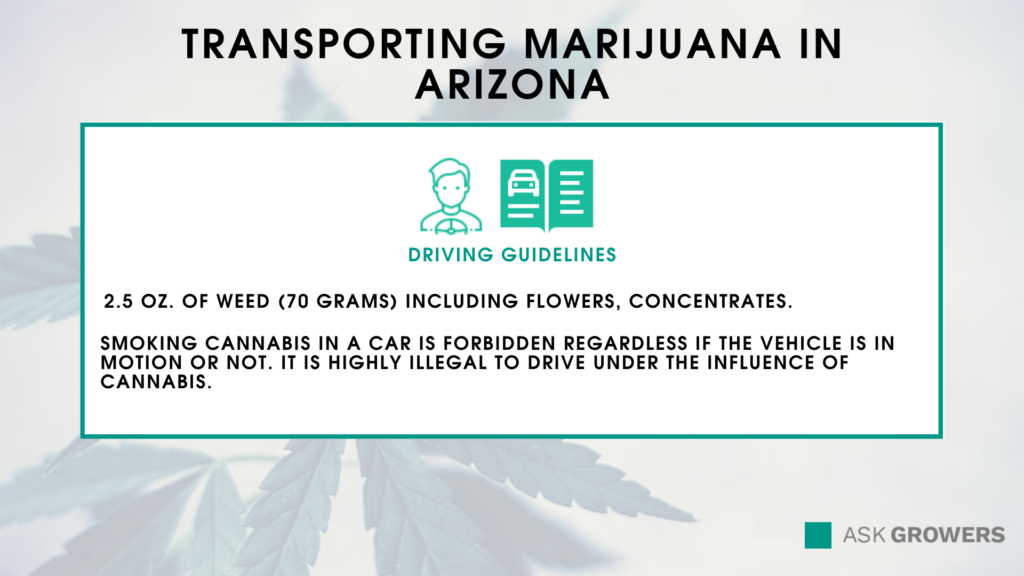
Exporting Marijuana
If you drive to Arizona from another state, you can have not more than 2.5 oz. of cannabis. This is legal only for MMJ patients. If you are driving out of the state, weed's possession depends on the surrounding state's laws. For example, Colorado, California, New Mexico, and Nevada allow individuals to cross the borders with cannabis. While Utah has just started its MMJ program and doesn’t currently support out-of-state MMJ cards.
Arizona law protects only registered patients and features one of the toughest criminal laws for recreational weed possession and use. Even a first-time use/possession charge carries felony charges, mandatory jail time, and steep fines. In April 2020, new regulations are expected.
Growing Marijuana
As mentioned above, cannabis can be cultivated in Arizona under 2 conditions:
- As an MMJ patient, you can grow up to 12 plants if your home is 25 miles away from the nearest operating dispensary;
- You are a caregiver of an MMJ patient.
The following cultivation laws should be observed:
- The plants should grow in a locked facility (a greenhouse or another enclosed area with security devices);
- The access is permitted only for MMJ patients;
- For growing marijuana legally, you have to register as an MMJ cultivator;
- Caregivers can assist in growing weed for 5 patients.
Regarding a new cannabis law, the cultivation of recreational weed will also be allowed (with a limit of 6 plants per one person).
Read Also: Guide On Cannabis Growers: Who They Are And How To Become A Cultivator
Licensing for growers, manufacturers, processors, retailers, etc.
The Arizona Department of Health doesn't authorize a weed cultivation facility that is not a dispensary because it is tied to a dispensary address. This means you cannot set up a facility for cultivation without being a pharmacy.
If you are a dispensary agent and want to apply for the first-time dispensary registration certificate, it will cost $5,000 ($2,500 for changing the location and $1,000 for a renewal certificate).
Sources
https://azdhs.gov/documents/director/administrative-counsel-rules/rules/guidance/gd-107-phs-edc.pdf
https://www.azdhs.gov/licensing/medical-marijuana/index.php
https://norml.org/laws/arizona-penalties/
https://en.wikipedia.org/wiki/Cannabis_in_Arizona
https://www.pinalcriminaldefense.co/medical-marijuana-and-driving-in-arizona/
https://arizonamedicalmarijuanaclinic.com/

 Guides
Guides

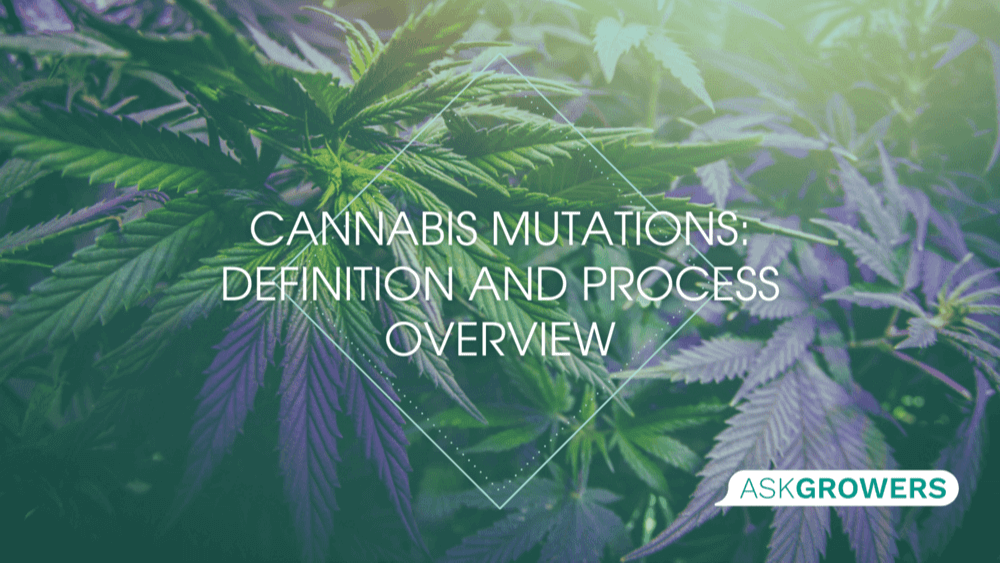
.png)
.png)
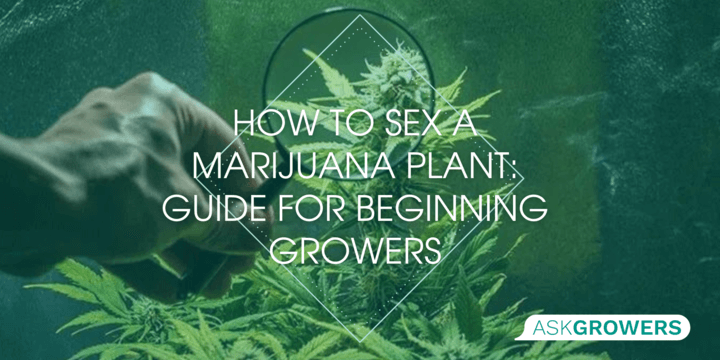


 (1).png)

.jpg)
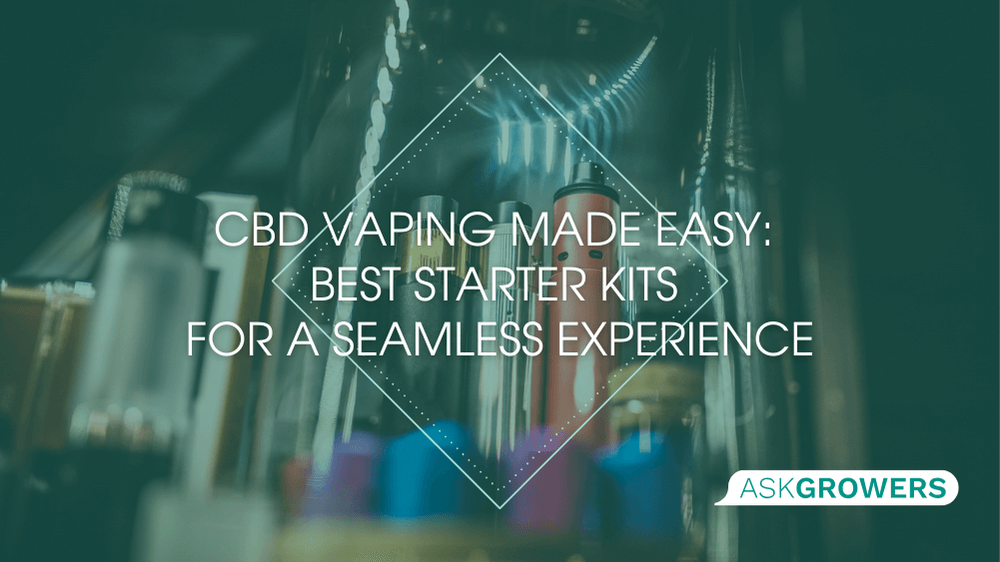
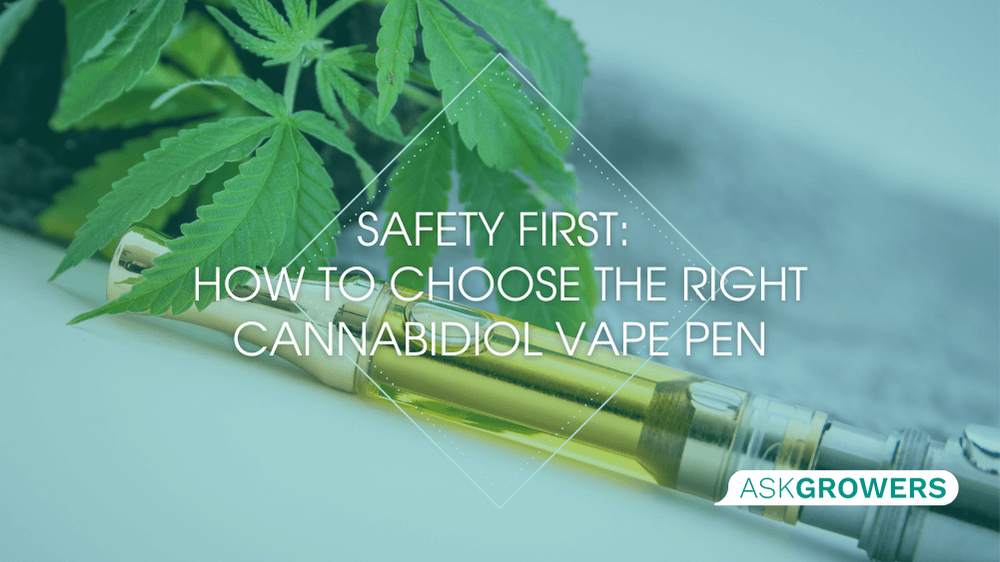
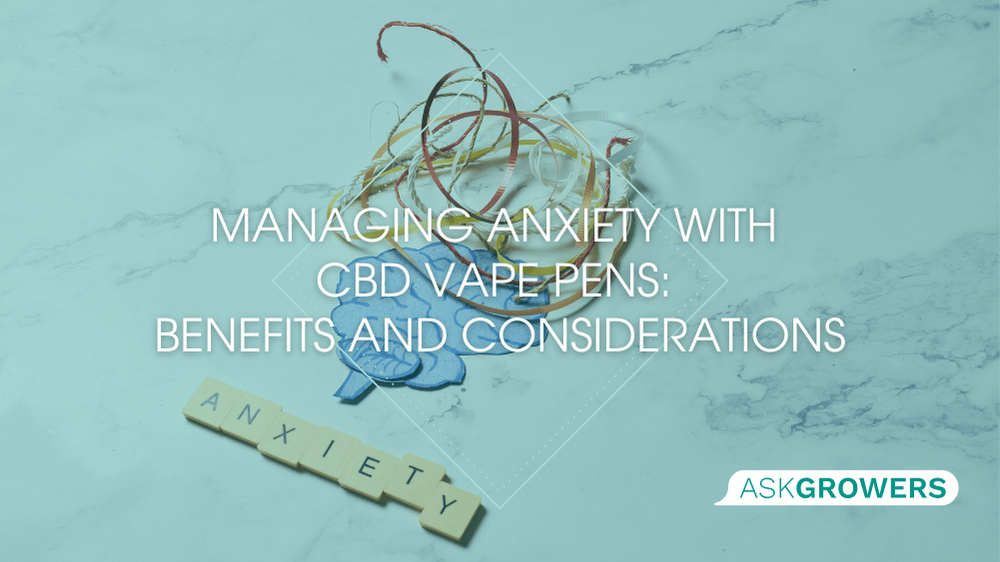
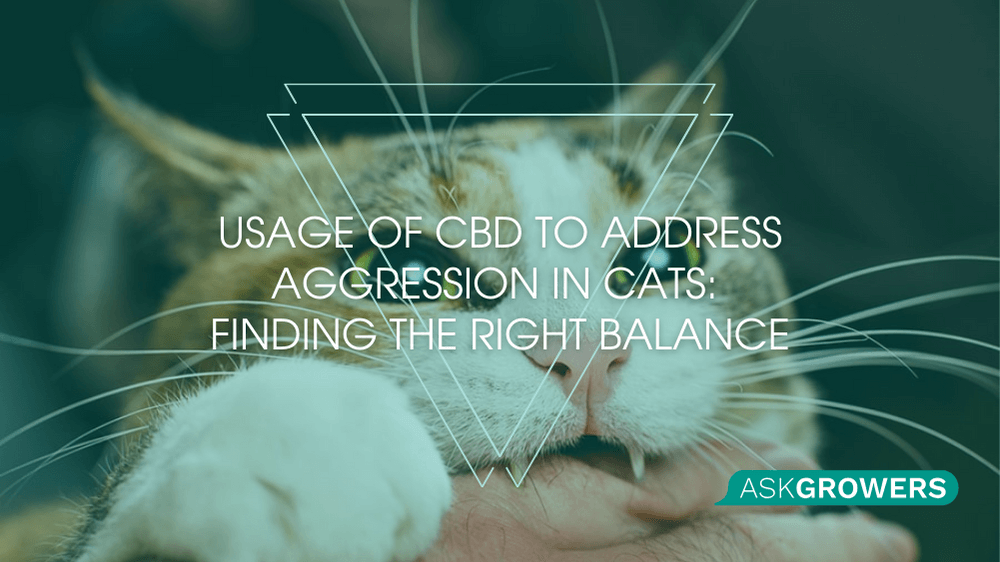
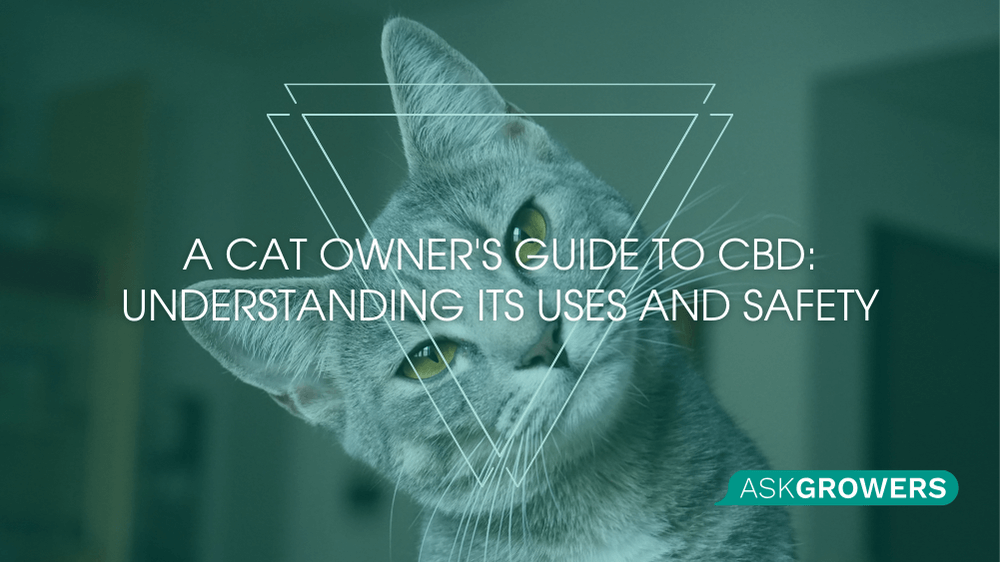
Be the first and share your opinion
Write a Review